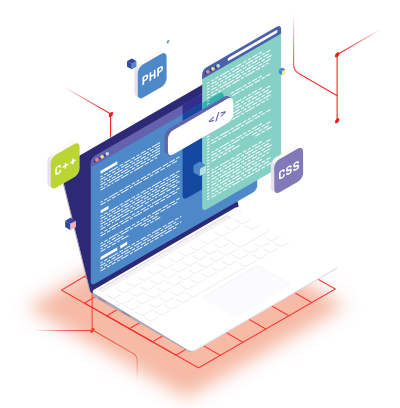Our DevOps Outsourcing Services

DevOps Outsourcing
You will be provided with a team of experienced DevOps engineers who are responsible for ensuring the software development lifecycle is efficient, secure, and reliable. We also offer solutions to help businesses develop, deploy, and manage their applications on cloud platforms such as AWS, GCP and Microsoft Azure or on secure private clouds.
CI/CD Pipelines
Our CI/CD pipeline services streamline your software development process by automating the integration, testing, and deployment of code. This ensures faster and more reliable delivery of software, allowing your team to focus on innovation.
Security Compliance
We provide comprehensive security compliance services to ensure your systems meet all necessary regulatory and industry standards. Our team conducts thorough assessments, implements best practices, and continuously monitors your infrastructure to protect against vulnerabilities.
Infrastructure as Code
By automating infrastructure management, we reduce the risk of manual errors, improve scalability, and ensure that your environment can be replicated and maintained effortlessly.
DevOps Transformation
This service includes a thorough analysis of the company’s existing IT infrastructure, development processes, and team structure, as well as the creation of a detailed plan for the transition to DevOps. The IT Svit team will also provide ongoing support and maintenance to ensure the successful implementation of DevOps practices and tools.
Hire Top-notch DevOps Implementation Partner
Want to delegate the development of a DevOps strategy or its implementation? We’ve got you covered. We’ve been helping businesses with technology transformation for over 18 years and have a proven track record of success around the world.
DevOps Outsourcing Services Process
When businesses team up with DevOps services, the results of collaboration between the two can be seen after a short period of time. However, to succeed at fostering DevOps culture and automating all processes in your organization, it’s crucial to understand what it takes to do so. Here are 5 stages of DevOps transformation that we will go through together:
Identify Business Needs
First, we understand your needs and goals by conducting thorough research. We discuss current operations and pinpoint areas for improvement. This allows us to create a focused, actionable plan for enhancing your business processes.
Assess Systems and Workflows
Next, we assess your systems through technical calls with stakeholders and IT teams. We gather detailed information about your current IT infrastructure or plan a new setup. This stage transforms business needs into a comprehensive plan, ensuring we meet DevOps goals on time and within budget.
Develop a High-Level Plan with Milestones
We outline the scope of work, identify constraints and risks, and set project timelines. We’ll choose the tools and technologies to be used and ensure stakeholders are fully informed about resource allocation and project requirements.
Set Clear Goals and KPIs
We establish specific, measurable goals and KPIs to track progress and ensure success. These metrics will guide our efforts and provide a clear framework for evaluating the effectiveness of our initiatives.
Execute the Plan
The execution phase involves the implementation of development, testing, and deployment processes using automation and agile methodologies. Our DevOps team collaborates closely to ensure efficient software integration and delivery, supported by continuous monitoring and feedback.
Continuous Improvement and Feedback
In this phase, we gather feedback from stakeholders and end-users to identify areas for further improvement. This ongoing process ensures that the system evolves to meet changing business needs and technological advancements.
Benefits of DevOps Outsourcing Services
Cost Efficiency
Outsourcing DevOps services can significantly minimize the costs associated with hiring and training in-house employees. It reduces the need for a big, permanent DevOps team, allowing you to pay only for the services you demand.
Access to Expertise
DevOps outsourcing gives you access to a team of professionals with specialized skills and knowledge. We ensure that your projects are managed by experts who keep up with the latest technologies and best practices.
Scalability
Outsourced DevOps services are flexible to meet your company’s demands. Whether you need to ramp up for a large project or scale down during slow periods, we would help you to manage resources more efficiently.
Improved Quality and Reliability
IT Svit team use industry best practices to ensure high-quality code and reliable systems. CI/CD pipelines, automated testing, and monitoring improve the overall quality and stability of your software.
Enhanced Security and Compliance
Outsourcing DevOps includes access to security experts who ensure your systems comply with regulatory standards and protect against threats. Regular security assessments and compliance checks help safeguard your data and maintain trust.
Risk Management
Our expirienced teams can better anticipate and mitigate risks associated with development and deployment. Their expertise helps in managing potential issues proactively, reducing the impact on your business.
Tools and Technologies We Use

Docker

Kubernetes

Red Hat OpenShift

Ansible

HashiCorp Terraform

Chef

Puppet

Jenkins

Dmytro Medvediev
CTO & Cloud Architect










